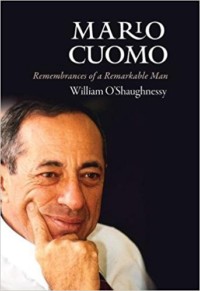Title: Mario Cuomo: Remembrances of a Remarkable Man
Author: William O’Shaughnessy
Publisher: Whitney Media Publishing Group
ISBN: 978-0-8232-7426-0
Pages: 307
Genre: Biography
Reviewed by: Dan MacIntosh
Pacific Book Review
William O’Shaughnessy’s biography on Mario Cuomo is unusual in Mario Cuomo: Remembrances of a Remarkable Man. It’s unusual because the writer did not just know his subject, but he was also Cuomo’s friend. Therefore, if you’re seeking an unbiased, warts and all assessment of Cuomo’s life – primarily as New York state’s governor – you won’t find it here. Instead, you’ll mainly take in many of the highlights of this notable politician’s career, from a man who is president and editorial director of Whitney Media, parent company for WVOX (and WVIP) where O’Shaughnessy oftentimes interviewed Cuomo on radio.
In fact, some of the material used for this book comes straight from direct transcripts taken from radio interviews with Cuomo that were conducted by O’Shaughnessy. There are also speeches Cuomo gave, as well as recollections of conversations between Cuomo and O’Shaughnessy. Most people know the basic facts of Cuomo’s career, that he was New York’s governor for three terms, from 1983 through 1994, he was staunchly on the political left and that he was rumored to be a democratic candidate for president often during his lifetime.
What you may not know about Cuomo — and something O’Shaughnessy does such a good job bringing out — is how Mario was so devoutly spiritual. You can sense O’Shaughnessy was in awe of this laudable personality trait, as well as – perhaps – a tad jealous of it. Cuomo, who passed away in 2015 at age 82, oftentimes quoted scripture in his speeches. He also either quoted or paraphrased both Christian and Jewish leaders during his talks. It’s admirable to reference spiritual thinkers during a speech; it’s quite another thing to base policies on scriptural teachings. As Cuomo wasn’t afraid to point back to religious justifications for many of his political actions. It would be tough to imagine a governor behaving that way today, particularly in the unreligious state of New York.
Cuomo, we learn, also felt deep empathy for immigrants in America. His parents came over from Italy, did not speak any English and were basically uneducated. Their early years in the United States were mostly about just surviving. So, when Cuomo was asked about his opinions on immigration policies, his position always came from personal experience. He knew what it felt like to grow up poor in an uncertain world. This not only made him an empathetic politician, but also a fully understanding human being. O’Shaughnessy comes from a different side of the political spectrum than Cuomo, and yet, he could see how Cuomo was basically a solid, good man. He knew Cuomo as a friend, first, and as a politician second. You walk away after reading this book sincerely believing O’Shaughnessy loved Mario Cuomo.
Unlike O’Shaughnessy, I came into reading this book knowing next to nothing about Mario Cuomo. However, I came to many of the same conclusions as O’Shaughnessy did about Cuomo’s character. When you read various speeches, and ones he gave throughout many years in his career, you notice how he was always consistent. He didn’t suddenly change his political opinions on the whim of public opinion or due to cultural shifts. He was the same man young, for the most part, as he was once he grew older. It’s impossible not to have respect for such consistency.
The only downside to O’Shaughnessy’s book – and it’s not entirely his fault – is that many of Cuomo’s phrases and opinions are repeated throughout the book. Granted, nobody would have wanted O’Shaughnessy to edit Cuomo’s talks. But for the reader, there is a strong sense of déjà vu – especially as he or she gets close to the book’s end. Except for this small complaint about the book’s repetitions, it’s tough to find fault with O’Shaughnessy’s remembrances. He’s right; Mario Cuomo was, indeed, a remarkable man.


